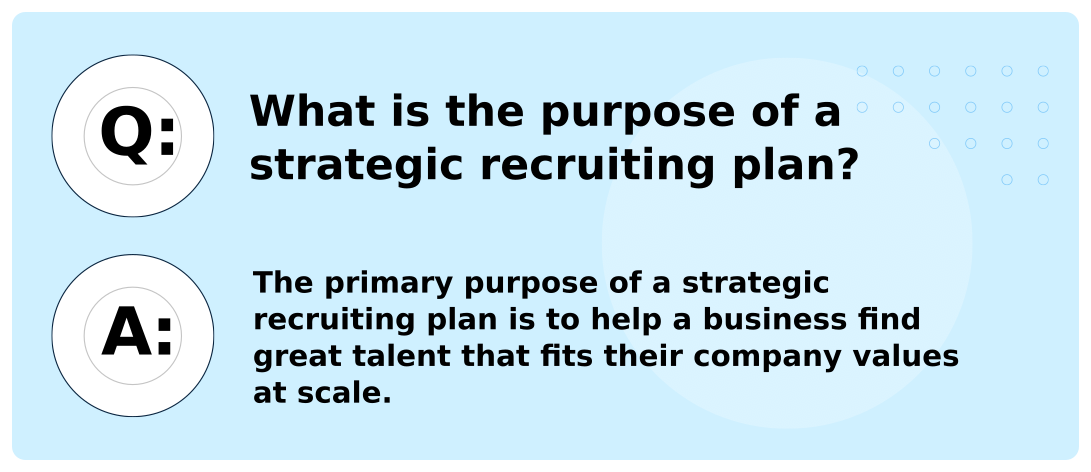
The modern recruiting landscape makes recruiting a critical but frustrating function for small business owners. Small businesses need foundational people to support their growth, but the time and cost of finding that talent can be overwhelming. An effective recruiting strategy involves the 3 stages of recruiting:
- Attraction
- Engagement
- Conversion.
What is strategic recruiting?
Strategic recruiting is taking an intentional and business-savvy approach to the recruitment process steps. It views the recruitment and staffing process as a potential avenue for competitive advantage as it gives your business the ability to attract great talent at scale. Small business owners need valuable people for their company to flourish. Effective recruiting is essential to success.

What is the purpose of a strategic recruiting plan?
The primary purpose of a strategic recruiting plan is to help a business find great talent that fits their company values at scale. A strategic recruiting plan looks at the business as a whole and stakeholders to clarify the requirements and develop the best way to attract appropriate talent. The secondary purpose of a strategic recruiting plan is to create a process that will grow with your company. Small business owners face many phases of growth. A strategic recruiting plan helps develop an effective and scalable methodology that works for a small business as it grows.
The 10 Steps of an Effective Strategic Recruitment Plan
These 10 steps are ways to break down the 3 stages of recruiting. These steps can be your company’s outline for how to write a recruitment strategy.
- Clarify the Role With Stakeholders- Discuss the needs of this role with all relevant stakeholders. This discussion should develop necessary skills, core competencies, experience, cultural fit, and salary. Balance both realistic and idealistic needs to attract the right talent pool.
- Develop Your Employer Brand- Effective recruiting means effective brand marketing. Establish how you want to communicate your culture, people, values, and work. Then, decide how this person would fit into the company brand. Providing this clarity helps potential recruits envision themselves in the company.
- Clear Posting with Keywords- For talent to find your job posting, they need to be able to search for it. In the job description, concise posts with industry-relevant keywords attract talent.
- Establish Consistency- The brand, job posting, people, and external media need to represent a consistent message. The brand shouldn’t promote a tech-forward workplace while the website is not intuitive. Take a holistic approach to evaluate your company’s brand and ensure consistency. When potential candidates do their research, they are confirming that your values are more than just words on the about page.
- Produce Engaging Content- Surveys, employee reviews, and videos are essential to the engagement stage of recruiting. Candidates are looking to get an understanding of what it is like to work for you, and engaging content can be a valuable part of this process. The about us page on the website is a good start, but we recommend engaging content in addition to the standard text.
- Offer to Connect- Potential candidates should be able to connect with someone in the business to learn more about the job and company. This connection can be as informal as a chatbot or as personalized as giving the hiring manager’s contact information. This practice helps your company stand out by being personalized and attracting a better-fitting talent pool.
- Create Scalable and Standard Decision-Making Processes- As your business grows, so will the needs of your recruiting function. Items such as scorecards, phone screenings, and transparent salary ranges will help make the process repeatable. Developing this process with stakeholders so they understand the goals of a strategic recruiting strategy leads to more effective recruitment.
- Communicate Through All Stages of an Application- According to this study, only 1% of Fortune 500 businesses communicate application status after the initial email confirming submission. Small businesses can strategically recruit by showing personalization and value to their applicants. Communication can set your recruiting process apart from the rest.
- Select Your Candidate- After doing steps 1-8, step 9 should be easier to decide based on the process and brand work you did ahead of time. Many companies skip the initial steps of recruiting and screening candidates that aren’t great fits or paying a recruiting firm to do the work of attracting candidates and explaining company values to them.
- Build a Development Plan- Perfect fits are rare. Most candidates will not have every skill or the perfect experience. However, building a development plan is an effective way to bridge the gap. Development plans are an effective strategy to turn a good candidate into a great hire and start as soon as the decision is made to hire a candidate.
Create an Effective Strategic Recruiting Plan with Milestone
At Milestone, we are an outsourced HR firm built to help build your back office processes, like recruiting, to support and grow your business. Strategic recruiting is a holistic approach that helps your company build and retain the right talent. Our team, led by M.T. Ray, is ready to help build an effective recruiting plan. At Milestone, we believe strong back offices are a competitive advantage. Contact us today to start building a stronger business.
Related Content

Startup Employee Benefits – Compensation and Health Benefits for Startup Companies
At its core, your startup or small business should include the following benefits: Health Insurance (vision and dental), paid time ...

How To Pay Employees in a Startup
At a fundamental level, HR management includes any tasks that help optimize your most valuable resource—your people!

What Are the 4 Fundamentals of HR?
At a fundamental level, HR management includes any tasks that help optimize your most valuable resource—your people!
Stay in the know